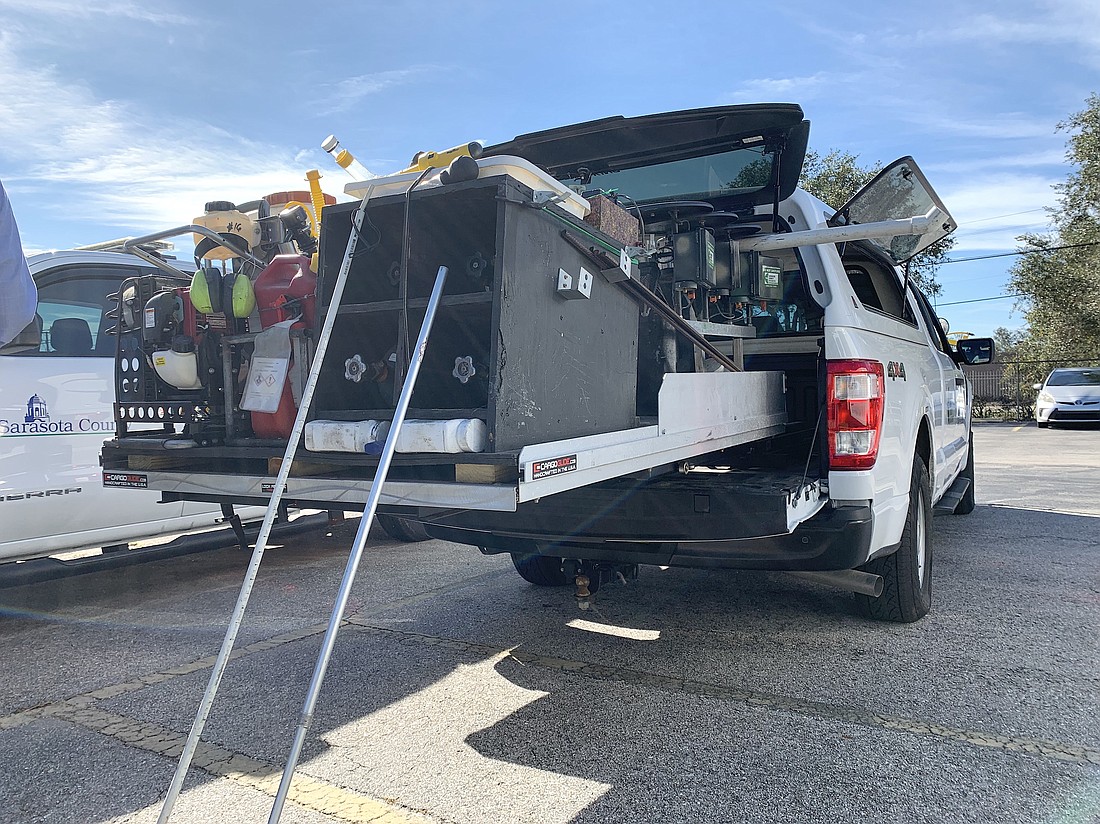- April 26, 2024
-
-
Loading

Loading

As the wet season approaches it brings with it mosquito season, and that means Sarasota County is ramping up its mosquito mitigation operations. With a year-round staff of 20, plus 11 seasonal workers, the Mosquito Management Department covers the entire 725 square miles of the county, including the city of Sarasota.
To keep mosquitos under control, that means they need the help of residents.
Mosquito Management focuses on killing the insects at the larvae stage, and department manager Wade Brennan said they know where to look and apply environmentally friendly, targeted products that kill only mosquitoes. It also uses “adulticides” when necessary, which includes spraying from trucks and planes.
Mosquito hunters wade deep into mangroves, marshy areas and other bodies of water thick with plant life to take samples and, where larvae are present, they treat right at the source.
Much of the adult mosquito presence in the urban environment, Brennan said, can be controlled right in your own backyard, in places where water can pool and serve as breeding grounds. These can range anywhere from bird baths to old tires where within 8-10 days eggs can hatch and larvae become adult flying mosquitos, some species that can fly miles from the source.
"The industry has really morphed in the sense that aduldicides are the last resort to manage the population because it's the least effective,” Brennan said. “It really costs a lot and it’s hard. If we can treat a small body of water or ditches themselves, we’re putting a little tiny bit of pesticide out there that's an extremely environmentally friendly bacteria that really only affects mosquito larvae.”
When spraying to control adult mosquitoes is necessary, that must occur within the three hours around sunset, when they are most active. Unlike the old days of fog trucks slowly moving down streets and covering neighborhoods with DDT, modern products are applied in low volume and, to be effective, the mosquitoes must be flying, conveniently at a time when beneficial insects such as butterflies typically are not.
"Some mosquitoes will actually overwinter and last months, and those are more problematic for West Nile virus because they can they can go on and on,” Brennan said. “It depends on the species, and that’s what’s important about our surveillance program because if we can identify the species that's causing the problem, we know exactly where they're coming from, how long they're going to be there, if their flight range is 300 feet or five miles. It's knowing what we're battling to know how to most effectively manage that population.”
As art of the county’s integrated mosquito management program, staff will respond to individual residents who report a problem. Typically, ponds that were well managed and creeks and streams with moving water are not the sources. Crews more typically find the breeding grounds on the residents’ property or somewhere nearby.
Most often in an urban environment, Brennan said, the source of the mosquitoes is man made.
“When it comes to the city of Sarasota, a lot of times people will be getting bitten during the day, and if that's happening, we know it's going to be (species) that are only from man-made containers,” Brennan said. “Their existence is baffling because if it wasn't for (humans), they wouldn't be here.”
Residents can request mosquito mitigating service to the county by calling 311 or 941-861-5000, or at scgov.net. The service is free of charge.
“We do ask people to keep in mind that if they can take care of their containers, that’s our biggest problem in city areas,” Brennan said. “The amount of time that it takes to go to everybody's backyard consumes a lot of our effectiveness for the entire neighborhood. It takes us about a half hour to an hour just to do one service call, and that's time we could be treating ditches throughout that entire neighborhood.”